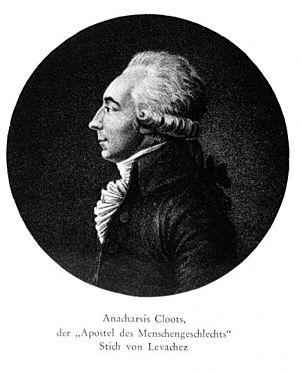Anacharsis Cloots facts for kids
Jean-Baptiste du Val-de-Grâce, also known as Anacharsis Cloots, was a nobleman from Prussia. He played an important role in the French Revolution. He was one of the first people to suggest the idea of a world parliament. He believed in a world united and was called the "orator of mankind." People also called him the "citizen of humanity."
Contents
Biography
Early Life and Ideas
Anacharsis Cloots was born in 1755 near Kleve, at a castle called Gnadenthal. His family was noble and came from the Netherlands. When he was eleven, young Cloots went to Paris for his education. There, he became interested in the ideas of his uncle, Cornelius de Pauw. His uncle was a writer, geographer, and diplomat.
Cloots later attended a military academy in Berlin. But at age twenty, he left the academy. He then traveled around Europe. During his travels, he shared his ideas about revolution. He also spent a lot of his family's money.
Joining the Revolution
When the French Revolution began in 1789, Cloots returned to Paris. He believed this was the perfect time to make his dream come true. His dream was a world where all nations were like one big family.
On June 19, 1790, he spoke to the National Constituent Assembly. He brought with him thirty-six people from different countries. He spoke for this "embassy of the human race." He declared that the world supported the Declaration of the Rights of Man and of the Citizen. After this, he became known as the "orator of the human race." He even changed his name from Baron Cloots to Anacharsis, after a famous book character.
In 1792, he gave 12,000 livres (money) to the French Republic. This money was to help arm fighters. They would fight against tyranny (cruel rule). After the riots of August 10, he became an even stronger supporter of new ideas. He declared that he no longer believed in traditional religions.
Role in the Convention
In the same month, Cloots was given the rights of a French citizen. In September, he was chosen to be a member of the National Convention. This was a very important group. He voted for King Louis XVI to be put to death. He said he did this for the good of all humanity. He also strongly supported the idea of spreading revolutionary ideas through war.
His Execution
Later, Robespierre pushed to have Cloots removed from the Jacobin Club. Many people still saw Cloots as a foreigner. The Committee of Public Safety accused a group called the Hébertists of working against France. They also included Cloots in these accusations. They wanted to make it seem like there was a foreign plot.
Even though it was clear he was innocent, Cloots was found guilty. He was then guillotined on March 24, 1794. He was executed along with the Hébertist leaders. A very large crowd watched his execution.
His Ideas
Cloots was a unique political thinker. He had his own ideas about the meaning of the French Revolution. He believed in the idea of a "world state." This meant he wanted all countries to be united under one government. He wanted the Revolution to have a broader, more international impact. He imagined the world government would work like the French Revolutionary Republic. Cloots wrote down his ideas in several books. His most important work was Bases constitutionnelles de la République du genre humain.
Works
- La Certitude des preuves du mahométisme (London, 1780)
- L'Orateur du genre humain, ou Dépêches du Prussien Cloots au Prussien Herzberg (Paris, 1791)
- La République universelle ou adresse aux tyrannicides (1792)
- Adresse d'un Prussien à un Anglais (Paris, 1790)
- Bases constitutionnelles de la République du genre humain (Paris, 1793)
- Voltaire triomphant ou les prêtres déçus (178?)
- Discours prononcé à la barre de l'Assemblée nationale par M. de Cloots, du Val-de-Grâce,... à la séance du 19 juin 1790 (1790)
See also
 In Spanish: Anacharsis Cloots para niños
In Spanish: Anacharsis Cloots para niños
 | Tommie Smith |
 | Simone Manuel |
 | Shani Davis |
 | Simone Biles |
 | Alice Coachman |



